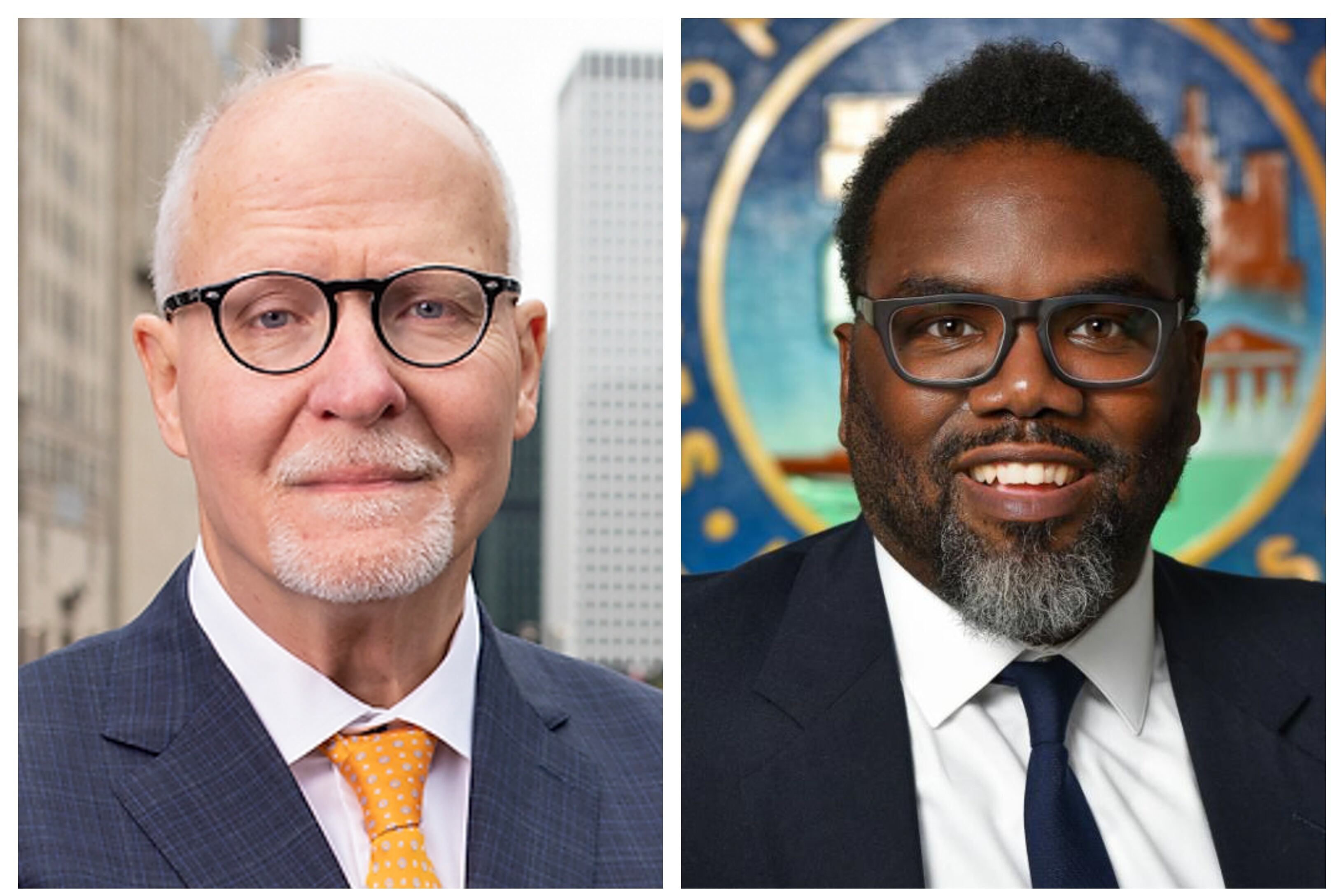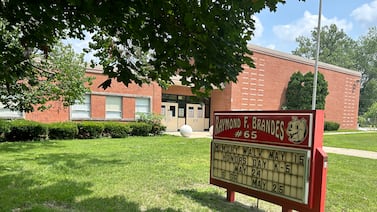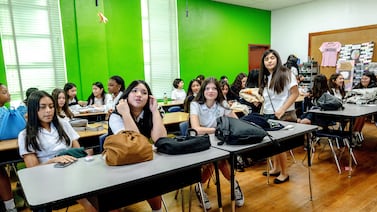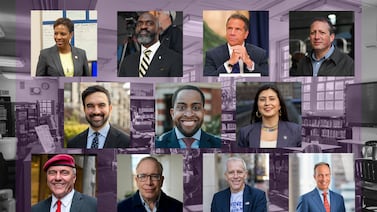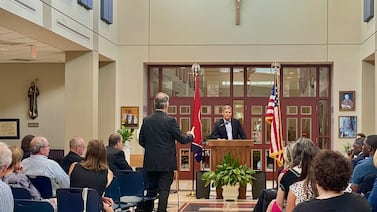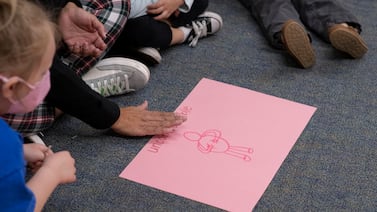Chalkbeat is a nonprofit news organization covering public education in communities across America. Subscribe to our free Chicago newsletter to keep up with the city’s public school system and state education policy.
Chicago’s next mayor will either be former Chicago Public Schools CEO Paul Vallas or Chicago Teachers Union organizer Brandon Johnson. In a stunning upset, the two defeated incumbent Lori Lightfoot and are headed for a runoff on April 4 because neither secured more than 50% of the vote.
Lightfoot called both Vallas and Johnson to congratulate them, she said in a concession speech just before 9 p.m.
“I will be rooting and praying for our next mayor to deliver for the people of the city for years to come,” said Lightfoot.
Vallas led the field of nine candidates with 34% of the vote, according to unofficial preliminary results posted by the Chicago Board of Elections Tuesday night. Johnson secured the second spot with just over 20% of the vote while Lightfoot trailed at 17% as results rolled in.
Shortly before 9 p.m., Vallas gave an impassioned speech in which he congratulated Lightfoot and thanked his supporters, saying it was because of them that he secured a spot in the April run off.
“I want to thank the voters of Chicago for making this campaign about the issues and nothing but the issues,” Vallas said.
In a speech at 9:30 p.m., Johnson said people didn’t know who he was a few months ago. “If you didn’t know, now you know,” he said, before thanking his wife and the “workers of this city.”
Lightfoot made history in 2019 when she became the first Black woman and first openly gay person to be elected Chicago mayor.
“Four years ago, I looked into the camera and spoke directly to young people of color who looked like me and to every kid who felt like I did when I grew up,” Lightfoot said. “I’m going to do that again tonight. I told you back then that anything is possible with hard work. And I want you to know that no matter what happens along the way you should always believe that because it’s true.”
With 98% of precincts reporting as of 10 p.m., U.S. Rep. Jesus “Chuy” García had just under 14% of the vote, businessman Willie Wilson had received 9%, and the remaining candidates each had less than 3% of the vote, according to unofficial results.
Though crime and safety eclipsed education as a top priority for voters this cycle, the candidates’ ties to education run deep. The winner of this election will also be the last Chicago mayor to have control of the city’s public schools — as the shift to an elected school board begins with 10 of 21 members elected in 2024.
As an organizer for the Chicago Teachers Union, Johnson advocated for an elected school board. In 2018, he was elected to the Cook County Board of Commissioners. Johnson taught at Jenner Academy and Westinghouse College Prep before moving into a union organizing role. His education platform promises more staff and free transit for students.
Vallas led Chicago Public Schools from 1995 until 2001 as the district’s first CEO under mayoral control. He later managed the public schools in Philadelphia, post-Katrina New Orleans, and Bridgeport, Connecticut, experience he touted Tuesday night.
“I’ve had success because I’ve always had the good sense to listen to the community, to empower the community and draw my leadership from the community,” Vallas said.
During his speech, Vallas also said schools needed to be part of addressing public safety, noting his platform promises to open school buildings on nights and weekends.
His complicated legacy has served as fodder for opponents who argue Vallas would be a “disaster” as mayor. But supporters have said Vallas’ reputation as a reformer is what Chicago needs. His education plan promises to expand school choice and open school buildings on nights and weekends.
In his speech, Johnson thanked his supporters and his wife, saying he “was so freakin’ proud.” Surrounded by supporters including Ald. Pat Dowell and Ald. Matt Martin, Johnson also thanked his union backers in the Chicago Teachers Union, SEIU, and United Working Families.
“We get to turn the page of the politics of old,” Johnson said.
He said people deserved fully resourced public schools. “Every single child in the city gets to have their needs met,” Johnson said.
During his speech, Johnson attacked Vallas’ education record, saying “he has literally failed everywhere he has gone.”
The unofficial early results include more than 240,000 ballots cast during early voting and those returned by mail as of Monday night. When the polls closed, 507,852 total ballots had been cast, which is roughly 32% of all registered voters, according to Max Bever, spokesperson for the city’s Board of Elections.
Earlier Tuesday, election officials said more than 100,000 mail-in ballots had yet to arrive at the Chicago Board of Elections to be counted. Bever said election officials have until March 14 to “collect and count all stragglers.”
Early and mail-in voting rates surpassed previous years, while overall turnout lagged on election day.
In recent weeks, polls had indicated a four-way toss-up between Lightfoot, García, Johnson, and Vallas. Other candidates include State Rep. Kam Buckner, activist Ja’Mal Green, Ald. Sophia King, Ald. Roderick Sawyer, and Wilson.
In a concession speech shortly after 8 p.m. Tuesday night, Buckner said the city couldn’t keep doing the same thing and expect different results. “We need to invest in students and not undermine our neighborhood schools,” Buckner said.
Buckner was the first candidate to release an education platform, which called for funding schools based on need not enrollment. As a state legislator, Buckner co-sponsored the bill creating an elected school board. He is also a graduate of Morgan Park High School on the far South Side.
Lightfoot did not make education a central part of her 2019 campaign, but much of her time in office has been characterized by conflict with the Chicago Teachers Union and pandemic school closures that have impacted learning and student mental health.
Tuesday night, she said she was proud of her administration’s work making “record investments in our public schools, adding school social workers, nurses, and special education case managers” and their efforts to “connect youth to mental health services, housing, education, job training, and legal services.”
Though he appeared to finish fourth on Tuesday, García famously took former Mayor Rahm Emanuel into a runoff in 2015, with the backing of the Chicago Teachers Union. But this time around, he relied on other unions for support as the teachers union backed Johnson’s bid for mayor. In announcing his late entry to the race last November, Garcia, a Democrat who represents Illinois’ 4th congressional district, said it was time for the city to “double down” on education. “Your ZIP code, race, and socioeconomic status should not determine your future,” he said.
Green called for universal preschool for 3-year-olds as part of his sweeping $5 billion public safety plan on the campaign trail. His plan also called for creating 10,000 apprenticeships for Chicagoans ages 13 to 25. “I’m a father who loves Chicago and I want a better future for my kids and yours,” Green said earlier this year.
King, who represents the 4th Ward which spans the South Side, serves as the vice chair of the Committee on Education and Child Development. She recently tried to push Chicago Public Schools officials to appear quarterly before aldermen or risk losing city money that supports school construction projects, but the measure failed. King helped found Ariel Community Academy, a public school created in 1996 under then-Mayor Richard M. Daley in partnership with Ariel Investments.
Sawyer, who has served as an alderman on the South Side for over a decade, sponsored a proposal in 2020 to remove Chicago police from public schools, but it was thwarted by one of Lightfoot’s allies and did not pass. His father became mayor in 1987 after the death of the city’s first Black mayor, Harold Washington. Sawyer served on the local school council at McDade Classical School, a public selective enrollment school.
Wilson, a high-profile businessman, has focused on rebuilding from the pandemic through “educational grants, trade and business recovery.” He promised to bolster vocational programs in high schools — a move already being undertaken by the district.
Becky Vevea is the bureau chief for Chalkbeat Chicago. Contact Becky at bvevea@chalkbeat.org.
Mauricio Peña is a reporter for Chalkbeat Chicago covering K-12 schools. Contact Mauricio at mpena@chalkbeat.org.

